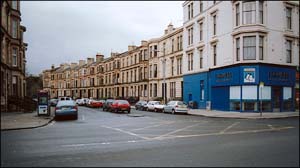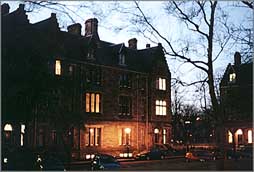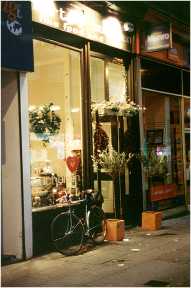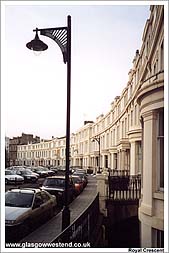Glasgow West End Property Market
 Sales in the City - November, 2009
Sales in the City - November, 2009
I was walking down Byres Road the other day, and could not avoid reaching an uncomfortable conclusion: the Byres Road that I remember from my youth has gone, never to return. The `hood has not changed for the better, and I found myself wondering is the West End going down the lavvy pan?
I am in that stage of life that I prefer to think of as `late youth,' but others may have another term for. I know that entering late youth has advantages, but so far they seem vastly outweighed by the disadvantages. One of the disadvantages is being on Planet Earth for so long, that one can remember a time when things were actually different.
I recall an era when, for example, if you arranged to meet someone, you agreed a time and place in advance, and tried to be there approximately on time, as opposed to the vague text message arrangements that seem the order of the day now. Or when it was possible to drive down Byres Road in less than 15 minutes. Or when there were shops that were worth visiting, like Aquarius, which sold posters by Roger Dean, and incense sticks. Or Listen, which sold records (or `vinyl'.) I remember, when I was in my early youth, feasting on half a pizza with fried egg at the Grosvenor Caff (now Vodka Wodka) and clandestine excursions from school to the George snooker hall (now M & S.)
As retail experiences go, Byres Road is lost beyond retrieval. Occasionally a little rose flowers among the thorns, only to perish months later, like the wonderful independent bookshop Lost in Fiction. A combination of unsympathetic commercial landlords, who would rather have their properties lie empty than have their portfolios devalued by accepting realistic rentals, and a blinkered City Council, who refuse to modify prohibitively high rates, means that it is virtually impossible for small businesses to survive on Byres Road. Yes, small shops open, but they rarely last long, as the owner's dream of owning a shop is dashed on the rocks of commercial reality.
 So the result is a Byres Road that is the homogenous High Street that we recognise from every city or town in the UK, with mobile phone warehouses, a Tesco Metro, Clinton Cards, Building Societies, - (wee touch of hypocrisy here-) estate agents, umpteen charity shops (they don't pay rates) and a cheque cashing shop. The funky places to eat and shop have been pushed out of Byres Road to more affordable areas. The impending demise of the wee shops in Ruthven Lane (the Council have granted planning permission for a new restaurant / retail development) looks like the last nail in the coffin. In fact, it seems to me that Hyndland Street is the new Byres Road, with the fabby Cafezique at its epicentre.
So the result is a Byres Road that is the homogenous High Street that we recognise from every city or town in the UK, with mobile phone warehouses, a Tesco Metro, Clinton Cards, Building Societies, - (wee touch of hypocrisy here-) estate agents, umpteen charity shops (they don't pay rates) and a cheque cashing shop. The funky places to eat and shop have been pushed out of Byres Road to more affordable areas. The impending demise of the wee shops in Ruthven Lane (the Council have granted planning permission for a new restaurant / retail development) looks like the last nail in the coffin. In fact, it seems to me that Hyndland Street is the new Byres Road, with the fabby Cafezique at its epicentre.
Ok, I know it's not all bad. There are still a few wee gems like Heart Buchanan and Demijohn at the top end, and Betsy la Belle at the (lace knickered) bottom. We are well served with coffee palaces, like Kember & Jones, and would you not just have to invent Tinderbox if it didn't exist? Tout le West End seems to drift through there at some point each day. But surely if Byres Road loses the shops that are unique and distinctive, then it ceases to be a draw to Glaswegians who live elsewhere, and to visitors? And does that not lead to a downward spiral, as the footfall falls?
 As if the demise of Byres Road as a retail attraction wasn't enough, the area has also to contend with the Council's seemingly avowed mission to turn it into party central by granting new pub licences, and extended hours. There was a time when going out for a drink in the West End meant socialising with other West Enders, and students, and Town and Gown co-existed in peace and harmony. But what in the name of the wee man was the reasoning behind allowing the licensed trade in the West End to expand to the point that the worst characteristics of Sauchiehall Street at chucking out time are now in the heart of a residential area? Could no-one on the Licensing Board have foreseen the noise, disruption and random violence that attend large late-night drinking venues? Since when did Glasgow's motto become `Let Glasgow's Pubs Flourish'? Is it not foolish in the extreme, and a waste of resources, to grant umpteen late licences, and then have to shell out for improved lighting, cctv systems, an increased police presence, and `taxi-marshalls,' to cope with the result and try to keep the peace?
As if the demise of Byres Road as a retail attraction wasn't enough, the area has also to contend with the Council's seemingly avowed mission to turn it into party central by granting new pub licences, and extended hours. There was a time when going out for a drink in the West End meant socialising with other West Enders, and students, and Town and Gown co-existed in peace and harmony. But what in the name of the wee man was the reasoning behind allowing the licensed trade in the West End to expand to the point that the worst characteristics of Sauchiehall Street at chucking out time are now in the heart of a residential area? Could no-one on the Licensing Board have foreseen the noise, disruption and random violence that attend large late-night drinking venues? Since when did Glasgow's motto become `Let Glasgow's Pubs Flourish'? Is it not foolish in the extreme, and a waste of resources, to grant umpteen late licences, and then have to shell out for improved lighting, cctv systems, an increased police presence, and `taxi-marshalls,' to cope with the result and try to keep the peace?
If you bought a flat at the west end of Sauchiehall Street within the last 15 years, then you will have known what you were letting yourself in for. But if you bought a flat in the west end even a few years ago, might you not reasonably have expected that your councillors would not have allowed licensed premises to proliferate?
On the bright side, if you do have difficulty sleeping, do not forget Senora Gomez from Valencia. Pilar Gomez bought a flat in what had been a quiet neighbourhood in Valencia, in the 1970s. However, those naughty Spanish councillors then allowed numerous bars and nightclubs to open in the area, to the point that poor Pilar couldn't sleep. In fact, by the 1990s, the area had become `acoustically saturated.' So Pilar did what any Euro citizen would do, and sued the council, citing a violation of Article 8 of the European Convention on Human Rights (right to respect for private life and the home).She won, to the tune of 3,884 Euros.
 Ok, I hear you cry, all very interesting (or not) to hear you pontificate from your hobby-horse, but was this article not posted on the property page of the site?
Ok, I hear you cry, all very interesting (or not) to hear you pontificate from your hobby-horse, but was this article not posted on the property page of the site?
Haud on, Kemosabe. All will become clear.
These developments are not good, from the perspective of the property market in the west end, particularly at a time when the property market is so depressed it needs Prozac.
On a very local level, it doesn't take much to put potential buyers off a property. It seems to me that anyone who owns a property that is within striking distance of Byres Road or Ashton Lane may be affected by this. The sound of the Big Bottle Bin getting tipped into the back of the lorry, or a rammy, or the ambulance attending the aftermath of the rammy: all these can be unwelcome intrusions in the early hours of the morning. A potential purchaser may think `hmm, nice flat, but I would prefer a quieter area.....' Less interest can easily translate into less value, particularly in a buyers' market, when buyers can be more choosy.
On the wider view though, there is no doubt that the West End has always enjoyed higher values than the rest of Glasgow, because, quite simply, it was considered the most desirable part of Glasgow to live in. A perception that the shopping is poorer, that the area has become wild on a Friday or Saturday night, is less safe, and has generally `gone down hill,' must inevitably, after time, lead to an overall loss of desirability, and hence a decline in property values. I know that we have had clients sell up in the west end, and move to the `burbs because they felt that they were too close to Byres Road.
Mind you, the thought of moving to Bearsden does bring to mind a little snippet of dialogue from the only good film Madonna made: Desperately Seeking Susan. Seeing Madonna's character (Susan) for the first time in a while, a friend exclaims `Oh my God, Susan! I thought you were dead!' to which Susan replies `no, just in New Jersey.......'
 The Property Report
The Property Report
And now, what you have been waiting for, here is the property report, based on sales over September and October 2009.
Generally, house prices are 2.2% higher in Strathclyde than this time last year. This slight rise however should be seen in the context of prices being low last year: in fact, prices are 7% lower than they were at the peak of the market at the end of 2007. Also, the number of transactions is very much reduced, with the number of new properties coming to the market half of what it was at this time last year.
We recently sold a 1 bedroom flat in Scotstoun for a little shy of £80,000. A two bedroom flat in the sought after Botanics area, with views over the Botanic Gardens, comfortably exceeded £170000. A very tidy 2 bed in North Kelvinside sold for a little shy of £200,000. A three bed in Woodlands climbed over the guide price into the mid £180s.
Now the caveat: the value of a property very much depends on how attractive it is, and these sale prices are for guidance only. GSPC member firms, like my own, have access to a bang up-to-date database of recent sale prices, with detailed information on the sold properties that non-solicitor estate agents can only dream about. So if you want to know how much your property might be worth, ask a GSPC firm, like Pattison & Sim, for an appraisal.
David J Howat.
Managing partner, Pattison & Sim, solicitors and estate agents.
November 2009.
Update: July 2009
It's the property market, Jim, but not as we know it....
 Sales in the City has been on sabbatical for so long that you could be forgiven for thinking that it had moved to a bi-annual slot, rather than the monthly publication that Patient Pat had envisaged. Mi dispiace, as I learnt to say the first time I hired a car in Italy.
Sales in the City has been on sabbatical for so long that you could be forgiven for thinking that it had moved to a bi-annual slot, rather than the monthly publication that Patient Pat had envisaged. Mi dispiace, as I learnt to say the first time I hired a car in Italy.
The property market has changed since the last time I put digits to keyboard. Changed is an understatement. The winds of change have laid waste to the property market as we knew it. The rules of the game have been rewritten. The sulphuric acid of recession has scarred the pudgy face of estate agency.
The Economy is Ill
There are two reasons for the considerable change in the property market. Firstly, the global recession, the early days of which saw the housing market plunged into uncertainty on the back of tightened credit, which wasn't so much crunched, as strapped onto a gurney and thrown in the back of the ambulance. So much has been written and spoken about the credit crunch that there is no need for me to add my tuppence worth. But I am going to any way. Despite the base rate being at an all time low of 0.5%, it is hard to find a mortgage (especially as a first time buyer) with an interest rate lower than 6%. It is still very hard for purchasers to get mortgages, with first time buyers hit hardest again.
How come we can pour billions into saving the banks, end up with a controlling interest in some of them, and then wash our hands of how they are run? Why is the government not instructing the banks to lower mortgage rates and make mortgages available on a sensible basis?
Home Report
The second reason for the rewriting of the rules is the Home Report, that blessed contrivance visited upon us by Holyrood. As I am sure you know (I do have a very well informed readership - I have seen both your CVs) any property put on the market after 1st December 2008 must have a Home Report.
 The Home Report has 3 bits: the property questionnaire completed by the seller; the energy report prepared by a surveyor; and a survey (carried out by a surveyor obviously.) The Home Report raises numerous issues, for both purchasers and sellers, and there is simply not the space here to go into them all. My firm prepared a detailed briefing for clients on the Home Report, which you are welcome to download by following this link:
The Home Report has 3 bits: the property questionnaire completed by the seller; the energy report prepared by a surveyor; and a survey (carried out by a surveyor obviously.) The Home Report raises numerous issues, for both purchasers and sellers, and there is simply not the space here to go into them all. My firm prepared a detailed briefing for clients on the Home Report, which you are welcome to download by following this link:
We now have 6 months experience of dealing with the Home Report, and, although the number of property transactions in that period is considerably lower than usual, some important issues are emerging through the haze.
Because the market is very depressed, the Home Report is undoubtedly acting to keep property values in check. In the happy days of a boom market, people would regularly pay well in excess of the survey value for a property. But those days are over, and even if the property is popular, and the estate agent is able to fix a closing date (remember them?) the sale price is only likely to creep marginally over the valuation put on the property by the surveyor in the Home Report.
 Psychology
Psychology
I believe there is a psychological component to this. In the good old days of 'offers over' prices, no-one could say how much a property was 'worth' until it was sold. The asking price put on the property by the estate agent was so far removed from the expected sale price as to be meaningless, and everyone knew it. So the estate agent wasn't really putting a price on the property at all. Each offering party got their own survey, and had to contend with the fact that another offeror might have got a higher figure from another surveyor. Sale prices were regularly well in excess of the survey values. Offerors just had to give the offer their best shot, and dig deep into their resources (and borrow to the max) to get the property they really wanted.
But under the new regime, the seller DOES put a value on the property. Not only that, but it is not even the estate agent's value. The value has been fixed by a fully qualified, (probably) highly experienced, member of a professional body, who is not a little worried that if he or she over values, the eventual lender may sue.
Let's not ignore the significance of the surveyors' liability to the lender (bank or building society) if they lend based on the valuation. Part of the fall out from the distress the banks and building societies have experienced from falling property values is that they would just love to pass on the grief to the insurers of the surveyors who valued the properties they lent on. I understand that there are numerous 'over valuation' claims against surveyors firms pending at the moment. Professional Indemnity (PI) insurance for surveyors is very expensive, especially if you have a bad claims record. And that, you might not be surprised to hear, is making Johnny (or Jenny) Surveyor really quiet conservative.
So the properties going on the market come with a pretty realistic valuation all nicely typed up and yours for the asking. I think it's a bit like the difference between the butcher putting his best mince in the window with a label saying 'Make me an offer' or a label saying '£4 per Kg.' In the latter example, aint nobody going in and offering £5 per Kg. The price is on the tin.
The effect of all of this is that the surveyor now has a far bigger role in the property market than he or she once had. They are setting the sale prices for the properties, and they are doing it with a heavy dose of realism.
Actually, it's not All Bad
Now, all of that might seem like good news for buyers, and crap news for sellers. But..... In fact, a constantly rising property market is good news for the following: (1) Merchant bankers; (2) mortgage brokers; (3) estate agents; (4) downsizers / opt-outers / re-locators to the Hebrides or God forbid the south side; and (4) Alastair Darling, who rakes in lots of lovely stamp duty to set off against his capital gains tax liabilities.
If you do not happen to be one of the above, or betrothed to or otherwise in the thrall of one of the above, then a stable or even falling property market is not a Bad Thing. If you are upsizing, then a falling market might even be rather lovely. Planning on selling what was a £150k flat in 2007 and moving to a £250k flat? So, your own flat may have fallen to £125, but the new one has come down to £200k. You're quids in on the price, the stamp duty, and the mortgage payments. You just have to get your head round the fact that the silly sum of money your property had increased in value to was on paper only, and unless you're the Chancellor or moving to Timbuktu, it doesn't really matter.
 And Another Thing
And Another Thing
While I am on the subject of the Home Report, please be aware that these have a limited shelf life, and in many cases, severely restricted usefulness. Many surveyors (but not the ones my firm instruct) are using the new Home Report regime as an excuse for declining to enter the roof-space of tenement properties. They are citing 'health and safety' concerns. Something to do with the ladder not reaching far enough through the hatch. Under the old regime, if you instructed a 'scheme 2' survey, the surveyor always got into the roof space and reported on the state of the roof structure. (Well, they did if they were worth their salt, and fit. A good surveyor is as fit as a butcher's dog.)
Consider the following: (a) tenement title deeds usually make all the owners liable for the roof; (b) the roof and chimney heads are held up with big heavy beams; (c) wooden beams get wet or dry rot if the roof leaks; (d) roofs leak, especially roofs that are 100+ years old; (e) it hurts if the chimney falls on your head; and (f) repairing roof beams doesn't come cheap.
It follows therefore that you would be really rather silly if you bought a tenement flat without a surveyor having looked at the roof-space and telling you what state it is in. So a Home Report without a roof-space inspection is Not a Useful Thing if you're buying a tenement flat (and, arguably, any property at all.) All of which means that even if that des-res you have your eye on has a Home Report, you may find yourself shelling out for a survey after all...... Good job MSPs!
Market Report
And finally, here is the market report.
We recently sold a one bedroom flat in North Kelvinside, in good condition, for the guide price of £115,000. A delightful two bed basement and ground floor conversion in Dowanhill exceeded its guide price at £165,000. A three bed in Gibson Street sold for the guide price of £235,000 within 10 days of coming on the market.
Now the caveat: the value of a property very much depends on how attractive it is, and these sale prices are for guidance only. GSPC member firms, like my own, have access to a bang up-to-date database of recent sale prices, with detailed information on the sold properties that non-solicitor estate agents can only dream about. So if you want to know how much your property might be worth, ask a GSPC firm, like Pattison & Sim, for an appraisal.
So, chins up! Don't get put off by the paper losses: get out there and move house. Your lawyer will love you for it.
David J Howat.
Managing partner, Pattison & Sim, solicitors and estate agents.
[email protected]
http://www.pattisonsim.co.uk
Should I do up my property before selling it?
August/September 2007
What happened to the summer? It hasn't so much flown by, as been swept by on a tidal wave of wind and rain. However, at least this humble article seems to have had an extended summer break, which is more than can be said for its author, whose summer highlight has been a couple of orthopaedic consults following inadvisable gym activities. After the last magnum opus on multiple occupancy, I feel like tackling a slightly lighter topic.
A question we frequently get asked is whether the owner of a property should do work to it before putting it on the market. Now, I am aware that there is no shortage of advice elsewhere on this topic. The television is a fairly redundant article in your correspondent's house, but I am aware that every second programme seems to be about making a killing by doing up houses. The only programmes about property I can bear to watch are Kevin McCloud's Grand Designs', and 'Location, Location, Location', but the latter interest has got more to do with having met The Honourable Kirstie Allsop when she was filming the first series.
The Hon. Kirstie told me that she ran a company who found property for clients. Sensing an opportunity for some celebrity goss, I asked if she'd had any famous clients. 'Well, I found Damon Albarn's house in Notting Hill for him' she said, 'and when Madonna first moved to London, I met her because she was interested in renting my Mum's house...'
Now, with all due respect to my mother, and her own smart apartment in Jordanhill, I can't quite imagine it's where Madonna would want to live if she were to relocate to Glasgow. But I do rather like the idea: that would make the net curtains of G14 twitch. This little anecdote does however go some way to explaining why the Hon. Kirstie is really quite posh.
It seems to me that as a result of these programmes, apocryphal stories, and maybe some true stories, a legion of amateur do-er uppers have been added to the already existing hordes of professional or semi-professional do-er uppers that existed before. Now everybody and their aunty think that all they need to make a fortune is buy a one bedroom property in Partick, knock a few walls down to make an internal kitchen, and before you can say 'building warrant and planning permission?' what was once a one bed is now a two, and Robert's your father's brother.
Can I sound a note of caution here? Not everyone finds a wee internal kitchen a source of joy: some people like a nice big traditional tenement kitchen, and would rather accept the fact that on the rare occasion they have guests to stay, someone is going to be sleeping in the sitting room. There is some evidence for the proposition that a one bedroom tenement flat with a traditional kitchen is worth much about the same as a converted two bed.
This business is all about margins of course. And that can lead to a variable quality in the standard of workmanship. I am sure we have all seen the magnolia walls, beige carpets, B & Q kitchen, and poorly painted skirting boards that characterise the hastily turned round done up.
What this frenetic demand for do-er uppers also creates, of course, is plenty of competition for that which needs done up. My firm recently sold a fundamentally beautiful property in an excellent location that required much doing up, and we had more than 200 viewers.
It follows therefore that if the property you are selling is in a poor state, by which I mean that the kitchen and bathroom clearly need to be replaced and redecoration is essential, and it is in a good area and a good building, there will no shortage of buyers who will think that there is a profit to be made. There might be merit in doing the work yourself, or having it done, and taking what profit there is. If you are in this position, I would suggest that you ask a valuer from an estate agent to give you an idea of the value is before and after the proposed work is done. My own firm, like most others, make no charge for providing this service. You also need advice on planning requirements and building control. An absence of the proper certificates may mean your project is difficult to sell. Ultimately, the decision might depend also on your enthusiasm and time availability for undertaking or managing such a project.
However, what if nothing major is required, but the property is looking a bit tired and dated? There is no doubt that the properties that sell for fantastic prices are the ones that have the wow factor: something that sets them apart from the run of the mill. This does not have to be an expensive kitchen or bathroom: it might be simply fresh and tasteful contemporary decor, sanded and varnished floorboards (please please no lammy: it already looks dated) a lack of clutter, a few nice bits of furniture and some tasteful pictures or prints. Do as much as you can to maximise the light: ditch heavy curtains for example. Nothing sells a property better than sunlight flooding in the windows. What you are trying to create is the impression that all the buyer needs to do is move in their own furniture, and they will be really happy here. A couple of thousand pounds judiciously spent may reap dividends at a closing date.
You can easily tell what a tenement building will be like to live in by walking through the close. Worrying signs (apart from large cracks and staining by the roof-light) are 12 uncollected copies of the yellow pages, a hundred copies of the local free-sheet, large piles of undelivered mail, bin bags, rusty bikes chained to the banister, a large notice imploring visitors not to make so much noise when leaving the building, and dirt. The most curious thing I saw in a close recently was a hospital type wheelchair that had obviously made it from the Western to the upper reaches of Hillhead. Remember that people coming to look at your property will start judging it from the moment they arrive outside, so do whatever you can to tidy up the entrance to the property and any shared close. I believe this is what is known to the TV pundits as 'kerb appeal.' A clean, tidy, freshly painted close gives the impression to the house hunter that the potential new neighbours care about the building, and their investment will be protected.
And now, here is this month's market report, based on recent sales in summer 2007.
Sales have been very strong indeed, fueled by the fact that westenders wilnae put their houses on the market until they have found something to buy, and hence there have been fewer properties on the market than we might usually expect at this time of year, and no shortage of buyers. But in today's Herald, there is an article predicting a slowdown in the Scottish market due to interest rate rises.
A very nice one bedroom top floor tenement flat in Broomhill, with a dining kitchen exceeded £175,000, (see my observations on conversions, supra.) It is hard to single out a two bedroom property - we've sold a lot of them- but a very attractive example in Kelvinbridge comfortably exceeded £200,000. You can never underestimate the effect of a property being in a desirable location: a three bedroom ex-local authority property, in a quiet part of Scotstounhill, reached a figure well over the 1/4 million pound mark.
Now the caveat: the value of a property very much depends on how attractive it is, and these sale prices are for guidance only. GSPC member firms, like my own, have access to a bang up-to-date database of recent sale prices, with detailed information on the sold properties that non-solicitor estate agents can only dream about. So if you want to know how much your property might be worth, ask a GSPC firm, like Pattison & Sim, for an appraisal.
Sales in the City will be back in October. In the meantime, happy house-hunting, or day dreaming about house-hunting.
David J. Howat. Managing Partner, Pattison & Sim. August, 2007.
19 Glasgow Road, Paisley, PA1 3QX; 00 44 (0) 141 889 3296
117 Byres Road, West End, Glasgow, G12 8TT; 00 44 (0) 141 334 7706
11 Park Circus, Park, Glasgow, G3 6AX; 00 44 (0) 141 331 9950
[email protected]
www.pattisonsim.co.uk
I am thinking of letting my flat out: do I need one of those Multiple Occupancy thingies?
David Howat, Managing Partner, Pattison & Sim
March / April 2007.
Well, I am in no doubt that spring is upon us, for sitting in my eerie in our Byres Road office there is a sure sign. Within the space of 5 minutes my estate agency colleagues have switched off the heaters, and put on the air conditioning. Now, I am not suggesting that our wonderfully friendly and dare I say it highly presentable people are hothouse flowers per se, but the maintenance of a constant 20?c at all times, regardless of climatic conditions, is clearly essential for proper deportment.
Last month I hinted that I might tackle in this month's Sales in the City the vexed question of Houses in Multiple Occupancy (HMOs). Frankly, I am not sure that I am up to this. I had what I believe is cynically referred to as 'man flu'last week and am still feeling a little peeky. But, then again, if I get it out of the way now I can forget about it and go onto something more interesting next month. Back in the day when I plied my trade in the Sheriff Courts, I went to Greenock to argue something fiendishly complicated before the charming and highly capable Sheriff Sir Stephen Young (as he then was, as we say, somewhat curiously.) At the end of two days of listening to me and my opponent refer to endless case law, legal textbooks, and whatever else we could get our hands on, Sir Stephen said: 'I will have to wrap a wet towel around my head and think about this. I will issue a written judgement later.'
I have followed Sir Stephen's advice when dealing with difficult legal matters. I have a wet towel wrapped around my head. I am able to continue.
 Let us get one thing clear from the start about the whole multiple occupancy licencing issue: although a lot of owners of flats undoubtedly find the rather byzantine regulations an enormous nuisance and a classic example of pettifogging bureaucracy, there are compelling reasons for regulation. On 4 March 1999, students James Fraser, and Daniel Heron, both 20, were killed in a fire in a flat on Melrose Street that they shared with a third student, who managed to escape. The flat, which was in the basement of the building, had bars on the windows, and the smoke alarms were defective. The owner, Mr Harry Singh, received a 2 year custodial sentence for lying at a subsequent fatal accident enquiry. The tenants had all been at Balfron High School together. James Fraser's mother was reported as saying: 'Families should be able to send their children to the city safe in the knowledge that they are living in safe accommodation.'
Let us get one thing clear from the start about the whole multiple occupancy licencing issue: although a lot of owners of flats undoubtedly find the rather byzantine regulations an enormous nuisance and a classic example of pettifogging bureaucracy, there are compelling reasons for regulation. On 4 March 1999, students James Fraser, and Daniel Heron, both 20, were killed in a fire in a flat on Melrose Street that they shared with a third student, who managed to escape. The flat, which was in the basement of the building, had bars on the windows, and the smoke alarms were defective. The owner, Mr Harry Singh, received a 2 year custodial sentence for lying at a subsequent fatal accident enquiry. The tenants had all been at Balfron High School together. James Fraser's mother was reported as saying: 'Families should be able to send their children to the city safe in the knowledge that they are living in safe accommodation.'
Indeed they should. Following this case, City of Glasgow Council stepped up a few gears in their efforts to control multiple occupancy properties.
A House in Multiple Occupation/h3>
So, what is a 'House in Multiple Occupation?'Believe it or not, this is where it starts to get confusing. There are three aspects to the whole issue: (1) planning, (2) licencing, and (3) landlord registration.
If the property is in 'multiple occupation'as defined by planning law, then it will require planning permission to be used as such. To work that out, have a look at the council's website: www.glasgow.gov.uk and follow the links to business / city plan / Part 2 / 3 Residential / Res 13 (Multiple occupancy.) Helpfully, this starts out by saying: 'There is no definition of multiple occupancy in planning legislation'. Nonetheless, the Council nail their colours to the mast, and do set out what they have decided constitutes multiple occupancy. In the West End of Glasgow the planning aspect is a little more generous: 4 or more unrelated occupants constitute multiple occupancy. Elsewhere in Glasgow, it is 3 or more. The 'West End'is defined according to a map, which is on the website. The Planning department has rigorous criteria for granting planning permission for an HMO. The criteria are set out on the site. You need to read these, but essentially unless you can prove that the property has been in multiple occupancy for at least 10 years, planning will not be granted unless the property has direct access to 'a lit street.' That, therefore, rules out tenement flats other than main doors.
Licencing
Once you have safely negotiated the whole planning aspect of HMOs, you need to deal with the licencing aspect. Confusingly, licencing has a different definition. Again, the Council's website has some information, including a guidance note.
Please note however that at the time of writing, the guidance note is inaccurate, as it appears to fail to take account of a recent change to the definition of multiple occupancy. There is a better source of information, being a booklet produced by the Scottish Executive, which you can download from: /www.scotland.gov.uk/Resource/Doc/47060/0028721.pdf
Basically, the licencing definition is a house (or flat) occupied by three or more unrelated people. A family of 20 can share the same property without fear, therefore, of this particular bit of legislation. Note that a cohabiting couple would count as 'related', so an unmarried couple could take in a lodger without contravening the HMO regulations. But, note that a recent relaxation of the rule means that an owners of the property (or member of their family that live with them) do not count towards the total.
The differing definitions mean, of course (and do try to stay awake at the back) that a 'three person'flat (assuming one of the occupiers is not the owner) in the west end (as defined on the council's special map) would not require planning permission for multiple occupancy, but would require an HMO licence.
The HMO Licence department imposes, of course, their own conditions, mainly designed to ensure that the premises are safe: a lot of these are concerned with fire safety. A list of the requirements is on the guidance note. The website also advises of the fairly hefty fee levied for considering the licence application (currently £1887 for a three year licence.)
A third issue to be dealt with is Landlord Registration. Basically, any private landlord required to be registered, regardless of the number of tenants. See Glasgow City Council's website on this point:landlord registration.
The Council will not allow registration unless the landlord is 'a fit and proper person'. The website sets out some criteria that they look at in this regard.
Needless to say the complexity of the issue, the expense of carrying out the required improvements, the expense of the application itself, and the impossibility of getting planning permission for a flat without a main door, means that a lot of larger flats are only suitable for larger families. This may well have the effect of moderating the value of a larger property, particularly if it is in a traditionally 'student' area, as the attraction of these properties as an investment is reduced.
Take professional advice
A word of caution: this whole area is extremely complex. Only a ninny would rely on something they read on the internet. If you are thinking of making a HMO licence or planning application, or if you are buying a property with a view to having more than three unrelated people live in it, you must take professional advice. I would suggest an architect experienced in HMO work would be appropriate.
This month's market report
Phew, and now for anyone still reading, here is this month's market report, based on recent sales (February and 1st week in March 2007.)
A nice one bedroom tenement flat in Hyndland, with a large dining kitchen, nearly reached the £160,000 mark. We have sold a lot of two bedroom properties recently, but a spectacular result was achieved by a garden flat in North Kelvinside that sold for around £250,000. Dorchester Avenue in Kelvindale is hugely popular, particularly with first time buyers, as the flats offer good value for money. We have just sold a very nice three bedroom ground floor flat there for well over £130,000.
Now the caveat: the value of a property very much depends on how attractive it is, and these sale prices are for guidance only. GSPC member firms, like my own, have access to a bang up-to-date database of recent sale prices, with detailed information on the sold properties that non-solicitor estate agents can only dream about. So if you want to know how much your property might be worth, ask a GSPC firm, like Pattison & Sim, for an appraisal.
See you next month, when I very much hope to tackle a somewhat lighter topic.
David J. Howat. Managing Partner, Pattison & Sim. March 2007.
Should you buy a flat for your student offspring?
David J. Howat, Managing Partner, Pattison & Sim.January/February 2007
Is it just me, or is the Scottish winter getting darker, windier, warmer, and wetter? Every time I step out of the door, I seem to get lashed by gales, and rain that travels horizontally then vertically up under my coat. Ever since I was interviewed for Scottish Television news on the subject of SEPA's warning about areas likely to flood (Austin Lafferty, the usual legal talking head, was at the hairdressers, apparently) I have become paranoid that all the houses we have bought for clients are liable to be flooded. Even the ones in areas with deceptive names like 'Dowanhill' or 'Hillhead.' Even the top floor flats. Stuck in a traffic jam on Great Western Road recently, I was overtaken by a U.S. submarine that had taken a wrong turning at Faslane. It really is that bad.
New Year is a time for re-appraisal, stock-taking, and decision making. There will be those of you out there with sons or daughters at university or college in Glasgow, who are questioning the wisdom of handing over hard earned to a landlord for the privilege of junior having somewhere to grab a few hours sleep and to store empty pizza boxes. In my day, the government actually paid students money to live on while at Uni, and this was enough to pay each term for halls of residence, which included breakfast and dinner. What was left over went on books. Well, some of it went on books. In later years, we moved into shared flats with no hot water and other deprivations too hideous to mention.
 But times have changed, and today's student is left to borrow the money to study from the state, the bank, or the Bank of Mum & Dad (whose terms, I understand, are often most favourable.) I never cease to be amazed at the number of mummies and daddies who come into our estate agency office with their student offspring, looking to acquire a nice flat for the duration of their studies. I know that the customer is always right, of course, but it can take an estate agent with a strong nerve to keep cool when an otherwise suitable property in Hyndland is rejected by Tabatha because 'it's too far from Byres Road.' A colleague experienced an extreme form of this. Having shown a number of schedules for one would have thought suitable properties, Precious turned to her father and said: 'daddy, tell the woman, these are not what we're looking for.'
But times have changed, and today's student is left to borrow the money to study from the state, the bank, or the Bank of Mum & Dad (whose terms, I understand, are often most favourable.) I never cease to be amazed at the number of mummies and daddies who come into our estate agency office with their student offspring, looking to acquire a nice flat for the duration of their studies. I know that the customer is always right, of course, but it can take an estate agent with a strong nerve to keep cool when an otherwise suitable property in Hyndland is rejected by Tabatha because 'it's too far from Byres Road.' A colleague experienced an extreme form of this. Having shown a number of schedules for one would have thought suitable properties, Precious turned to her father and said: 'daddy, tell the woman, these are not what we're looking for.'
But let's examine the facts:
| West End: Average Price | ||||
|---|---|---|---|---|
| Annual change in average property values | Cumulative change from Q1 1999 | |||
| Date | Average Price £ | Change £ | Change % | |
| Q1. 1999 | 92,388 | - | - | - |
| Q4. 1999 | 100,634 | 8,246 | N/A | 8.9% |
| Q4. 2000 | 106,297 | 5,663 | 5.6 | 15.1% |
| Q4. 2001 | 108,438 | 2,141 | 2.0 | 17.4% |
| Q4. 2002 | 122,459 | 14,021 | 12.9 | 32.5% |
| Q4. 2003 | 138,892 | 16,433 | 13.4 | 50.3% |
| Q4. 2004 | 150,746 | 11,854 | 8.5 | 63.2% |
| Q4. 2005 | 162,844 | 12,098 | 8.0 | 76.3% |
| Q4. 2006 | 173,990 | 11,146 | 6.8 | 88.3% |
(Source: GSPC)
This table shows the average increase in prices for west end properties since 1999. On average therefore, if you bought a property in 1999, and sold it in 2006, it would have increased in value by 88%. Just to add my own, purely unscientific data, it is not uncommon for us to sell a property and find that it has doubled in value over a period of 5 years. It all depends, of course, on the particular property, the demand at the time it was sold and whether the owner has improved it.
Now, I am not a financial adviser, accountant, or any other type of financial guru, and you should obviously consult such a person for advice, but it seems to me that short of putting your life savings on the 2.30 at Doncaster, you ain't going to see that type of return on your pennies from any other type of investment (and the 2.30 clearly has a degree of risk.) Add to this the fact that if you choose to buy a property for a student offspring someone (probably you) will be saving on the rent each month, and the concept starts to look like a no brainer for those with the money to do it. Even if you don't have the money to do it, the saved rent might well cover, or go a long way towards, the cost of a buy to let mortgage (you will usually only be able to borrow 85% of the survey value.) Two bedroom properties are particularly suitable for this arrangement, as another student can be brought in to help with the mortgage. (More than two unrelated occupants and you get in to the whole multiple occupancy issue: I may take a deep breath and tackle this thorny subject next month.) If you have more than one child who is likely to go to Uni or college, and you can persuade them both (or all) to come to Glasgow, you could be looking at a minimum of 7 to 8 year ownership, making the whole idea highly attractive.
There is yet another advantage to the whole 'flat for offspring' concept: Inheritance Tax planning. This is too big a subject to go into here, but if your combined estate is worth more than £285,000 (current threshold) you have an I.T. issue to think about, and passing on part of your wealth during lifetime might be part of the answer.
You should, of course, consult a solicitor, accountant, or other suitably qualified person for advice on these matters. My own firm, for example, regularly acts for parents and students who are purchasing in this type of situation.
Market Report
Now, here's the market report, based on December's sales. A nice one bedroom starter flat, with the kitchen at the back of the sitting room, in Thornwood, sold for well over £90,000. We sold a number of two bedroom flats, but a lovely one, with a beautiful internal kitchen, again in Thornwood, did very nicely at just under £160,000. A modern three bed in Yorkhill, with two bathrooms, and in nice condition, did spectacularly well when it left the buyer with not much change out of £200,000. Another excellent price was achieved by a three bedroom traditional tenement garden flat in Hyndland, in excellent order, which was near the £215,000 mark.
Now the usual caveat: the value of a property very much depends on how attractive it is, and these sale prices are for guidance only. GSPC member firms, like my own, have access to a bang up-to-date database of recent sale prices, with detailed information on the sold properties that non-solicitor estate agents can only dream about. So if you want to know how much your property might be worth, ask a GSPC firm, like Pattison & Sim, for an appraisal
Happy New Year and may 2007 see as few interest rate rises as possible.
David J. Howat,
Managing Partner, Pattison & Sim.
January 2007.
Why Do Estate Agents Fix Such Low Offers Over Prices?
Articles by David Howat of Pattison & Sim, Solicitors & Estate Agents
December 2006
As I write this, the Scottish winter is throwing all it's got at us. Byres Road is best seen from the sanctuary of Heart Buchanan Kitchen, I would say. It is the time of year when estate agents top up their tans, and contemplate tidying the stationery cupboard. For there is no denying it (and I know of one agent who does try to deny it by banning the Christmas tree and decorations,) but as soon as the Sally Army are out on Byres Road playing 'Oh Come, All Ye Faithful', peoples' minds are not on moving house.
But what better time than Christmas to deal with an old chestnut: 'why do estate agents fix such low offers over prices?' Oh, if I'd had a penny for every time I've been asked this. Like all great mysteries of the universe, the answer is shrouded in the mists of time.
 A long, long time ago, when non-solicitor estate agents were dominant in the West of Scotland, people expected to pay over the asking price, as the words 'offers over' imply. But at that time, the margin was 10%. We've moved on a lot since then. Hardly a day passes in our office on Byres Road without someone coming in and asking 'how much over the asking price are properties going for?' I can understand their confusion. And it is not a question one can answer other than by saying, well, 30%. By that, I mean that it is now standard practice for the agent to arrive at the offers over price by subtracting 30% from the figure they are expecting the property to sell for. But please don't assume that either (a) the property will sell for as much as 30% over the asking price, or (b) it will sell for as little as 30% over. Some sell for less, some sell for more.
A long, long time ago, when non-solicitor estate agents were dominant in the West of Scotland, people expected to pay over the asking price, as the words 'offers over' imply. But at that time, the margin was 10%. We've moved on a lot since then. Hardly a day passes in our office on Byres Road without someone coming in and asking 'how much over the asking price are properties going for?' I can understand their confusion. And it is not a question one can answer other than by saying, well, 30%. By that, I mean that it is now standard practice for the agent to arrive at the offers over price by subtracting 30% from the figure they are expecting the property to sell for. But please don't assume that either (a) the property will sell for as much as 30% over the asking price, or (b) it will sell for as little as 30% over. Some sell for less, some sell for more.
The criticism of this practice is that it gives a misleading impression to house-hunters of the figure that the agent and client are willing to sell for, and induces house-hunters to waste money on survey fees.
So, why do the agents do this? The theory is, 'to generate interest'. A low asking price will get more people over the door, which will create a flurry of interest, which will mean lots of people offering at a closing date. 'But', I hear you exclaim, 'surely that is unfair on the unsuspecting house-hunter, who will end up viewing property they can't ultimately afford, and unfair on the poor client, who will have lots of people who can't afford the property coming to see it'. Ah, the agent will rejoin, but +30% is well known in the West End, and no house-hunter will be so na?ve. Well, if that's the case, you ask, how come it works? If everyone knows to add on 30%, surely you won't get more people over the door than if you just put the true price on it in the first place!
At that point, the agent will fall silent, as you have delivered a verbal check-mate. All I can say is: it works. Selling houses is a black art, that doesn't always stand up to analysis. I have known of properties that have achieved more at a closing date on a lower offers over price, than any offer received when the property was on the market at a fixed higher price. It may well be difficult for house-hunters to get a handle on, but provided some advice is sought at the outset from a solicitor experienced in the West End market, then it should be possible for house-hunters to understand the system.
Now, I can sense a charge of hypocrisy being levelled at me, as my own firm puts low offers over prices on the properties we sell too. In our defence, I have to say that no one agent is going to be able to change this now well established practice. If we were to go back to the +10% mark up, for example, the properties we are selling would seem overpriced. In short, it is a practice that may be of dubious value, but it is here to stay.
My advice, if you are house-hunting, particularly in the West End of Glasgow, is to find a solicitor familiar with the local market, who is able to spend time advising you in relation to the likely sale price of a property before you survey it. That way, you should be able to pursue an interest only in properties that are likely to sell within budget. My colleagues in the conveyancing department at Pattison & Sim spend a lot of time with our clients at the early stage of their interest in a property. Our experience, knowledge, and access to the superb GSPC database are invaluable to our clients.
Now, here's the market report. We recently sold a one bedroom traditional tenement flat in Dudley Drive in Hyndland for well over £150,000. A lovely two bedroom tenement flat in Lawrence Street, with an internal kitchen, did extremely well at a closing date at more than £190,000. And a very large four bedroom flat with dining kitchen, requiring modernisation, in Hyndland, recently sold at a closing for well over £280,000.
Now the caveat: the value of a property very much depends on how attractive it is, and these sale prices are for guidance only. GSPC member firms, like my own, have access to a bang up-to-date database of recent sale prices, with detailed information on the sold properties that non-solicitor estate agents can only dream about. So if you want to know how much your property might be worth, ask a GSPC firm, like Pattison & Sim, for an appraisal
Have a good Christmas. More Sales In The City in the New Year.
David J. Howat.
Managing Partner, Pattison & Sim.
December 2006
www.pattisonsim.co.uk/patsim
Is the property market ever quiet in the West End?
David J. Howatt
October / November 2006
I was in one of the big chain estate agents on Byres Road a couple of weeks ago, and heard a negotiator tell a potential client that the market was 'quiet; quieter than it should be for this time of year.' I did not have the same impression at the time, and it got me wondering: 'Is the property market ever quiet in the West End?
The answer to this is: 'all things are relative.' A quiet market in the West End exists, and as I write this, things are definitely on the quiet side due to the October week holiday, but let's be honest, we would all still rather be selling property here when it's quiet, than on Barra at boom time. I think the number of properties on the market may vary for seasonal reasons, economic reasons, or for reasons that defy any kind of explanation, but the number of house-hunters remains pretty constant. So demand occasionally outstrips supply. And you don't need a degree in economics to work out that this may be favourable for sellers.
 West End Grid
West End Grid
No, what freaks West End estate agents out is what I call the 'west end grid lock', and I don't mean the junction of Beith and Byres. It happens like this. West-enders don't worry about selling their properties; they worry about not finding (or being able to afford) the right property to move to. So they won't put their property on the market until they get an offer accepted for a new property. But of course, if everybody thinks like that, then there won't be enough properties on the market for those potential purchasers to buy. Grid-lock sets in.
I am not sure that I accept the apparent orthodoxy in the West End that it's best to buy first. If you are moving within the West End, you have two highly relevant unknown factors: 'how much will I get for my own property?' and 'what will I have to pay for the new property?' Does it not make sense to go house-hunting with the first question answered, and hence know exactly how much you can afford?
Market Report
Now, here's the market report. We recently sold a one bedroom traditional tenement flat with a good sized kitchen in nice condition in Yorkhill for comfortably over £120,000. A cracking two bed in White Street sold for a hefty sum in excess of £180,000. A really smart full three bed with a large dining kitchen in Woodlands made our client very happy when it sold last week for well over £220,000. But the runaway property this month was the lovely mid-terrace in Broomhill with four bedrooms and a large dining kitchen that sold for a smidgeon under the half-million. And not even in the Jordanhill catchment. So, in conclusion, the market is temporarily quiet this week, but demand remains strong, and prices are high.
 Now the caveat: the value of a property very much depends on how attractive it is, and these sale prices are for guidance only. GSPC member firms, like my own, have access to a bang up-to-date database of recent sale prices, with detailed information on the sold properties that non-solicitor estate agents can only dream about. So if you want to know how much your property might be worth, ask a GSPC firm, like Pattison & Sim, for an appraisal
Now the caveat: the value of a property very much depends on how attractive it is, and these sale prices are for guidance only. GSPC member firms, like my own, have access to a bang up-to-date database of recent sale prices, with detailed information on the sold properties that non-solicitor estate agents can only dream about. So if you want to know how much your property might be worth, ask a GSPC firm, like Pattison & Sim, for an appraisal
Finally, here's a thought: this is a column about property NOT written by Justin & Colin. That's got to be good.
Happy House-hunting.
David J. Howat.
Managing Partner, Pattison & Sim, Solicitors & Estate Agents,
19 Glasgow Road, Paisley, PA1 3QX; 00 44 (0) 141 889 3296
117 Byres Road, West End, Glasgow, G12 8TT; 00 44 (0) 141 334 7706
11 Park Circus, Park, Glasgow, G3 6AX; 00 44 (0) 141 331 9950
[email protected]
www.pattisonsim.co.uk
Photographs by Jim Byrne from Photo Gallery






